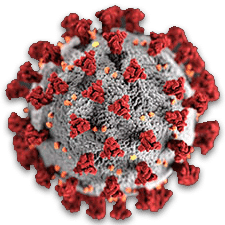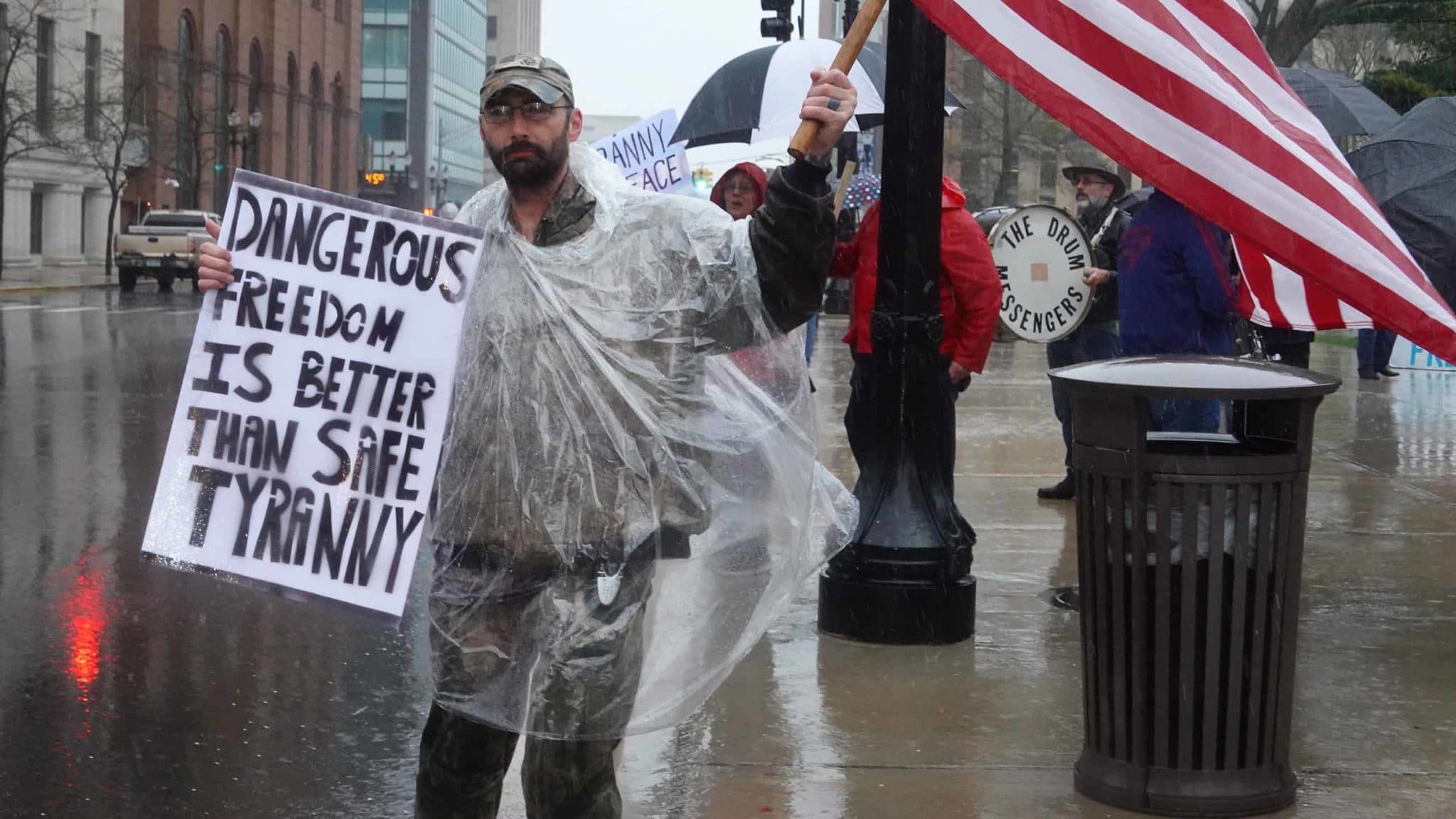In a 4-3 decision on Wednesday, the Wisconsin Supreme Court struck down the state’s stay-at-home order, which had shuttered schools, prohibited gatherings, and closed many businesses. The decision sent state officials scrambling to draft new measures to slow the spread of Covid-19, which has killed more than 430 people in Wisconsin. Meanwhile, some people flocked to bars and other reopened venues.
The dispute pitted Democratic Gov. Tony Evers and his Department of Health Services Secretary, Andrea Palm, against Republicans in the state legislature who had come to see the shutdown as overly restrictive. Describing the policy as a “controlling, subjective judgment asserted by one unelected official,” four of the court’s conservative justices ruled that Palm had overstepped her authority.
In an energetic dissent, Justice Rebecca Frank Dallet accused her colleagues of “torturing the plain language” of the law, engaging in judicial activism, and willfully ignoring “Wisconsin’s longstanding history of giving a broad grant of power to its public health authority.”
While recent polls have shown broad popular support for lockdowns, the dispute reflected growing tensions nationwide over shutdown orders.
In Pennsylvania, after some county officials defied the state’s stay-at-home order, Gov. Tom Wolf threatened to cut off those counties’ access to Covid-19 relief aid. An Illinois attorney, The Chicago Tribune reported this week, has helped dozens of individuals and businesses file lawsuits and complaints challenging that state’s restrictions. And in Washington, D.C., President Donald J. Trump broke with Anthony Fauci, the most prominent scientist on the White House Coronavirus Task Force, after Fauci warned that lifting restrictions too soon could lead to “needless suffering and death.” Trump described Fauci’s warnings about reopening as “not an acceptable answer.”
At issue is a high-stakes scientific question: How quickly will the virus spread if restrictions are lifted? Most experts warn that doing so could lead to a resurgence of cases unless there is a robust program to test, trace, and isolate infected people. But there are political questions at play, too — about the economic and social costs of lockdowns, and about the civil liberties implications of policies that restrict movement for weeks or months on end.
Federal courts have historically given states wide latitude to exercise power in times of a public health emergency, as Undark reported two months ago. But, at the time, public health experts warned that restrictive measures could have limits. Without clear, consistent messaging from policymakers, measures to soften the economic impact of quarantines, and broad public buy-in, lockdowns could inspire serious backlash.
That appears to be happening. The past few months have seen government leaders struggling to rally the country with a clear, feasible path back to reopening. Erratic messages from the White House, profound economic hardship, missteps in social-distancing enforcement, and disinformation campaigns have contributed to the public discord. “If your only tool is coercion,” Boston University public health scholar Wendy Mariner told Undark in March, “the public will probably get their backs up.”
In this week’s Abstracts, we deliver our weekly roundup of coronavirus stories that defined the week’s news, and that are likely to be relevant in the weeks ahead.
 |
Thoughts or questions on Covid-19? |
• Covid-19 deaths have surged in Latin America, but there’s little data available about the extent of the crisis.
Some cities in Latin America are experiencing fatality statistics on par with those recorded in Europe and the United States, with far fewer resources available to handle the outbreak. Brazil has become the worst hit country in the region, with more than 196,000 cases and more than 13,000 deaths. In Manaus, a remote Amazon city of 2 million people, officials have run out of hospital beds and are struggling to bury their dead. Difficulty in accessing supplies has worsened the situation and raised fears among the hundreds of indigenous groups that live in the surrounding area, who often have little access to medical care. Even in neighboring Peru, where lockdown measures and economic aid were swiftly rolled out, cases rose to more than 76,000 this week, with more than 2,000 deaths. Experts are careful to point out that the toll of the pandemic in these and other countries could be much higher than officially reported. In Mexico, health care workers and officials have said numbers they’ve reported have not been reflected in federal government tallies. “If Mexico is good at anything, it’s hiding numbers,” one disgruntled scientist at the National Autonomous University of Mexico told Vox.
• Sen. Richard Burr steps down as head of the Senate Intelligence Committee, amid a probe into stock sales linked to Covid-19 predictions.
Richard Burr, a Republican from North Carolina, has temporarily relinquished his role as head of the Senate Intelligence Committee, Senate Majority Leader Mitch McConnell announced Thursday. The move comes amid an investigation by the Federal Bureau of Investigation — an agency within the Intelligence Committee’s purview — into whether Burr profited from the pandemic through insider trading. In late February, while his committee received daily briefings on the virus’ growing threat to national security, Burr dumped up to $1.7 million in stock even as he publicly downplayed the pandemic’s danger. Last week, it was revealed that Burr’s brother-in-law also sold stock just before the pandemic-induced market crash, though Burr has denied their actions were coordinated. Burr’s sell-off, first reported by ProPublica in March, drew widespread condemnation and quickly became the subject of an FBI probe. On Wednesday, Justice Department officials said two warrants had been served — one to Burr, allowing agents to seize his cellphone, and one to Apple to obtain information from Burr’s iCloud account. Some legal experts say the execution of warrants is a significant development in the case against Burr. Others have expressed doubt that the investigation will be able to prove his actions were in violation of the relatively-untested STOCK Act, which bars federal lawmakers from using privileged information to guide financial transactions. Three other senators — California Democrat Dianne Feinstein, Georgia Republican Kelly Loeffler, and Oklahoma Republican James Inhofe — have also received scrutiny for their well-timed transactions.
• More details emerged this week about the White House’s plan to fast-track a Covid-19 vaccine.
This week, the Trump administration revealed that it has tapped Moncef Slaoui, the former vaccine chairman for pharmaceutical giant GlaxoSmithKline, to head Operation Warp Speed, the White House’s ambitious effort to produce 300 million doses of a coronavirus vaccine by January 2021. The announcement is one of few details to have emerged about the project, which aims to develop, test, and deploy a vaccine in far shorter than the 18 months that public health experts have said is a realistic timeline. Earlier this week, reporting by Science sketched out some of the contours of the planned operation: Warp Speed will identify eight candidate vaccines to fast track for testing and manufacturing, an official said, adding that vaccines made in China will not be considered and that the 300 million doses will be reserved for Americans. Some health experts caution that the “America First” approach is a mistake, arguing that it is counterproductive to exclude Chinese drug makers, who have had a months-long head start in the hunt for a vaccine. “It’s a global problem,” said Seth Berkley, head of GAVI, the Vaccine Alliance, “and it needs a global solution.”
• Small medical practices, community health centers, and rural hospitals are struggling to survive the pandemic.
Even before the spread of Covid-19 started upending health care in the United States, there were signs of trouble across the medical profession. Rural hospitals were closing at an alarming rate. Daunted by rising costs, even insured Americans were cutting down on their doctor visits. The coronavirus, though, medical professionals say, is amplifying those troubles into a full-blown financial crisis. Hospitals have deferred profitable elective procedures to accommodate a surge of Covid-19 patients; patients are avoiding coming into clinics; doctors are canceling routine visits. By some accounts, income in some practices has dropped by as much as 50 percent. U.S. primary care doctors and their patients are in crisis, Vox reported late last month, noting that, despite some relief from stimulus bills, there is concern that many physicians will eventually shutter their practices. Another story, published in Undark last week, chronicled just such a family practice in Brooklyn, which had turned to GoFundMe to help stay afloat. Meanwhile, representatives of rural health care are warning that Covid-19-related income losses are expected to lead to a rush of additional hospital closures. At the same time, rural hospitals are bracing for growing numbers of coronavirus patients, as infection numbers continue to rise in small communities across the country.
• Georgia modified a policy allowing teens to receive driver’s licenses without taking a road test.
States across the U.S. are grappling with how best to award driver’s licenses to student drivers during the Covid-19 pandemic. Typically, states require new drivers to pass a road test, having them sit in close quarters with a tester — a difficult proposition while social distancing measures are in place. Earlier this month, Georgia Gov. Brian Kemp signed an executive order temporarily allowing teens with instruction permits to qualify for a license without any supervised driving tests, up until the lockdown orders expired May 13. This week, though, Kemp signed a new executive order calling for drivers issued licenses under the previous order to take a road test by September 30. Meanwhile, in Wisconsin, a pilot program, launched on Monday, allows student drivers to skip a road test to receive a probationary license. Those applying for their test to be waived must be under 18, have an adult sponsor’s consent, and have had their permit for six months with no violations. State Department of Transportation officials hope that the new program, in addition to addressing the Covid-19 situation, will also cut through a backlog of road test requests, which as of this week sat at around 16,000.
There’s plenty of excellent reporting and analysis available.
Below is a list of some of the journalists, experts, and publications that Undark is following.
- Helen Branswell (@HelenBranswell), senior writer, infectious diseases, STAT
- Peter Sandman and Jody Lanard, risk communication experts
- Kai Kupferschmidt (@kakape), molecular biologist and science journalist, Science Magazine
- Trevor Bedford (@trvrb), computational biologist, Fred Hutchinson Cancer Research Center, Seattle
- Lawrence Gostin (@lawrencegostin), professor of global health law, Georgetown University
- Muge Cevik (@mugecevik), infectious disease researcher, University of St. Andrews
- A. Marm Kilpatrick (@DiseaseEcology), infectious disease ecologist, UC-Santa Cruz
- Julia Belluz (@juliaoftoronto), health correspondent, Vox
- Ed Yong (@edyong209), science writer, The Atlantic
- Kaiser Health News, full coronavirus coverage
- ProPublica, full coronavirus coverage
- U.S. Centers for Disease Control and Prevention, latest coronavirus news
- World Health Organization, rolling coronavirus updates
- Global Covid-19 Case Tracker, Johns Hopkins Center for Systems Science and Engineering
- Brief19, a review of Covid-19 research and policy
- The Covid-19 Tracking Project
- The Syllabus, Coronavirus Reading Lists
- Virus Academics Twitter list
Undark will continue to provide weekly roundups of Covid-19 news each Friday for as long as the pandemic continues. You can find our own Covid-19 coverage here.
Deborah Blum, Lucas Haugen, Jane Roberts, Francesca Schembri, and Ashley Smart contributed to this roundup.










